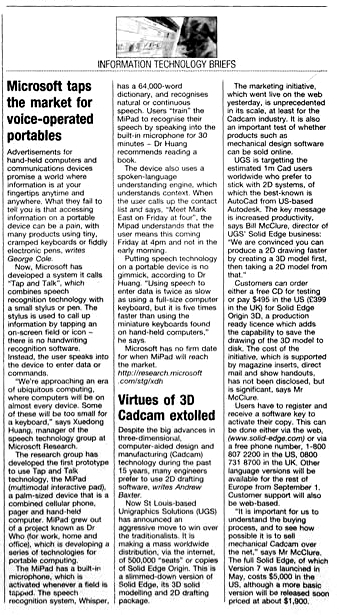Microsoft taps the market for voice-operated portables
- Publication: Financial Times
- Date: 1999-08-03
- Author:
- Page: 12
- Language: English
Advertisements for hand-held computers and communications devices promise a world where information is at your fingertips anytime and anywhere. What they fail to tell you is that accessing information on a portable device can be a pain, with many products using tiny, cramped keyboards or fiddly electronic pens, writes George Cole. Now, Microsoft has developed a system it calls "Tap and Talk", which combines speech recognition technology with a small stylus or pen. The stylus is used to call up information by tapping an on-screen field or icon - there is no handwriting recognition software. Instead, the user speaks into the device to enter data or commands.
"We're approaching an era of ubiquitous computing, where computers will be on almost every device. Some of these will be too small for a keyboard," says Xuedong Huang, manager of the speech technology group at Microsoft Re-search.
The research group has developed the first prototype to use Tap and Talk technology, the MiPad (multimodal interactive pad), a palm-sized device that is a combined cellular phone, pager and hand-held computer. MiPad grew out of a project known as Dr Who (for work, home and office), which is developing a series of technologies for portable computing.
The MiPad has a built-in microphone, which is activated whenever a field is tapped. The speech recognition system, Whisper, has a 64,000-word dictionary, and recognises natural or continuous speech. Users "train" the MiPad to recognise their speech by speaking into the built-in microphone for 30 minutes - Dr Huang recommends reading a book.
The device also uses a spoken-language understanding engine, which understands context. When the user calls up the contact list and says, "Meet Mark East on Friday at four", the Mipad understands that the user means this coming Friday at 4pm and not in the early morning.
Putting speech technology on a portable device is no gimmick, according to Dr Huang. "Using speech to enter data is twice as slow as using a full-size computer keyboard, but it is five times faster than using the miniature keyboards found on hand-held computers," he says.
Microsoft has no firm date for when MiPad will reach the market. http://research.microsoft.com/stg/xdh
Disclaimer: These citations are created on-the-fly using primitive parsing techniques. You should double-check all citations. Send feedback to whovian@cuttingsarchive.org
- APA 6th ed.: (1999-08-03). Microsoft taps the market for voice-operated portables. Financial Times p. 12.
- MLA 7th ed.: "Microsoft taps the market for voice-operated portables." Financial Times [add city] 1999-08-03, 12. Print.
- Chicago 15th ed.: "Microsoft taps the market for voice-operated portables." Financial Times, edition, sec., 1999-08-03
- Turabian: "Microsoft taps the market for voice-operated portables." Financial Times, 1999-08-03, section, 12 edition.
- Wikipedia (this article): <ref>{{cite news| title=Microsoft taps the market for voice-operated portables | url=http://cuttingsarchive.org/index.php/Microsoft_taps_the_market_for_voice-operated_portables | work=Financial Times | pages=12 | date=1999-08-03 | via=Doctor Who Cuttings Archive | accessdate=28 May 2025 }}</ref>
- Wikipedia (this page): <ref>{{cite web | title=Microsoft taps the market for voice-operated portables | url=http://cuttingsarchive.org/index.php/Microsoft_taps_the_market_for_voice-operated_portables | work=Doctor Who Cuttings Archive | accessdate=28 May 2025}}</ref>
